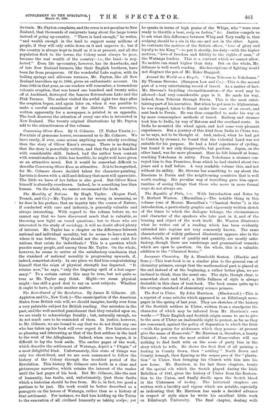The Rear - Guard of the Revolution. By James R. Gilmore. (D.
Appleton and Co., New York.)—The emancipation of the American States from British rule will, we should imagine, hardly ever form a very palatable subject for British reading. Our mistakes in the past, and the well-merited punishment that they entailed upon us, we are ready to acknowledge frankly ; bat, naturally enough, we do not much care to be reminded of them. In justice, however, to Mr. Gilmore, we are bound to say that we do not think any one who has taken up his book will ever regret it. Few histories are so pleasing and interesting as that of the first settlers in the land to the west of the Alleghanies. Indeed, when once begun, it is difficult to lay the book aside. The earlier pages of the work, which describe the settlement of Watanga, depict a " Utopia " of a most delightful kind. Unfortunately, this state of things was only too short-lived, and we are soon summoned to follow the history of the Colony through the troubled period of the Revolution. This history Mr. Gilmore sets forth in a clear and picturesque narrative, which retains the interest of the reader until the last pages of his book. But Mr. Gilmore, like the rest of humanity, has faults, and, unfortunately, !just those faults which a historian should be free from. He is, in fact, too good a partisan to be just. His work would be better described as a panegyric on the heroes of Watauga, rather than as a history of that settlement. For instance, we find him holding up the Tories to the execration of all civilised humanity as taking scalps; yet
he speaks in terms of high praise of the Whigs, who " were ever ready to throttle a bear, scalp an Indian," Fic. Justice compels us to ask what this difference between Whig and Tory really is, that scalping should be a sin in the one and not in the other. Again, he contrasts the motives of the British officer, "love of glory and loyalty to his King "—to put it shortly, his duty—with the higher motives, " love of freedom and fidelity to the rights of man," of the Watauga leaders. This is a contrast which we cannot allow. No motive can stand higher than duty. But on the whole, Mr. Gilmore is well worth reading. His descriptions of fighting would not disgrace the pen of Mr. Rider Haggard.


















































 Previous page
Previous page